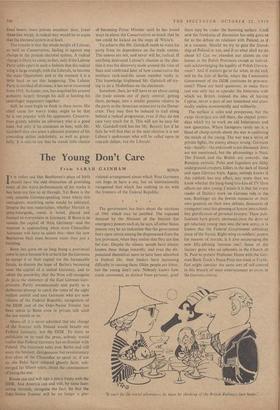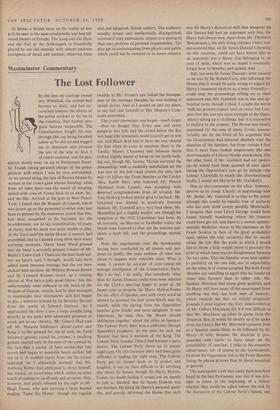The Young Don't Care
From SARAH GAINHAM BONN
IT is rather sad thnt Beethoven's place of birth should hay e the odd distinction of providing some of the .\\ orst performances of his works it
has been my fate to sit through. Yet Bonn is the only .sizeable German-speaking town where this outrageous stumbling noise would be tolerated.
Despite the. new materialism, whether Marxist or petty-bourgeois,, music is loved, played and listened to everywhere in Germany. If Bonn is to remain the capital of West Germany—and the moment is approaching when even Chancellor Adenauer will have to admit this—then the new Beethoven Hall must become more than just a building.
• Bonn has gone on so long being a provincial town in spirit because it is so hard. for the Germans to accept it as their capital for the foreseeable future, to dismiss the hope of Berlin's becoming soon the capital of a united. Germany, and to admit the possibility that the West. will recognise de /ado the existence of the East German Gov- ernment. Partly unconsciously and. partly as a deliberate attempt to catch the votes of the eight million central and cast Germans who are now citizens of the Federal Republic, recognition of the DDR and of the Oder-Neisse frontier has been taboo in Bonn even in private talk until the last month or so.
Above all, it is never. admitted that any change of the frontier with Poland would benefit. not Federal Germany, but the DDR. To listen to politicians or to read the press, nobody would realise that Federal Germany has no frontier with Poland. The imminent talks over Berlin and still more the hesitant, disingenuous but revolutionary first effort of the Chancellor to speak at, if not to, the Poles have released ghostly facts, sub- merged for fifteen years, about the consequences of losing the war.
Russia can and will sign a peace treaty with the DDR. And America can and will, by some face- saving formula, recognise the fact. So that the Oder-Neisse frontier will be no longer a pro-
visional arrangement about which West Germany can hope to have a say, but an internationally recognised fact which has nothing to do with the frontiers of the Federal Republic.
The government has fears about the elections of 1961 which may be justified. The repeated demand by the Minister of the Interior for emergency powers such as, he says, all other States possess may be an indication that the government fears open unrest among the dispossessed from the lost provinces, when they realise that they are lost. for ever. Despite the silence, people have always known these things inwardly, and even the dis- possessed themselves seem to have been absorbed in Federal life; their leaders have increasing difficulty in rousing them. Older people are bitter, but the young don't care. Nobody knows how much communal, as distinct from personal. grief
there may be under the booming surface. Until now the frankness of discussion has only gone as far as the debate on relations with Poland, as if in a vacuum. Should we try to gain the friend- ship of Poland or not, and if so what shall we do about it? Can we abandon our claims on our homes in the Polish Provinces except as individ- uals acknowledging the legality of Polish Govern- ment? And if matters go so far what, in the end, will b© the fate of Berlin, where the Communist Government of the DDR continues its provoca- tions? These are hard questions; to make them real one only has to consider the bitterness \\ith which we British resisted the idea of leaving Cyprus, never a part of our homeland and prac- tically useless economically and militarily.
The surface is calm and prosperous, but the ewige Gestrigen are still there, the eternal yester- days which try to work on old bitternesses and new ignorance. Where foreigners rarely see it, a flood of cheap novels about the war is confusing the minds of the young. The war was a series of private fights, the enemy always wrong. Germans win—locally—the end-result is not discussed. Jews are not mentioned, but the phraseology is Nazi. The French and the. British are cowards; the Russians animals. Poles and Jugoslays are filthy underground creepers, killers in the dark of blond and open German boys. Again, nobody knows if this rubbish has any effect, any more than we know whether the bang-bang kiss-kiss of TV films affects our own young. Certain it is that for eN cry reader of Dallin's work on German rule. in the east, Reitlinger on the Jewish massacre or their own generals on their own defeats, thousands of youngsters read this glossing of horror into school- boy glorification of personal bravery. These pub- lications have greatly increased„since the drive to get reluctant young men into,the'new it is known that the Federal Government subsicii,c, some of the frantic Right-wing ex-soldiers' papers for reasons of morale; is it also encouraging the new fifty-pfennig heroism. too? Some of the literary gems who sat solemnly in the Church of St. Paul to present Professor Heuss with the Ger- man Book Trade's Peace Prize last week at Frank- furt might consider the same sort of self-control in this branch of mass entertainment as exists in the German cinema. In Berlin, a British essay on the reality of war is to be seen in the least comfortable and best all- round theatre in Europe. The Long and the Short and the Tall at the Schlosspark is beautifully played by our old enemies with almost uncanny lovingness of detail and manner, observed from real, not imagined, British soldiers. The audience, socially mixed and intellectually distinguished, received it with enthusiastic respect as a posing of their own problem of personal responsibility. The play got an understanding from players and public which could not be bettered in its home country.







































 Previous page
Previous page